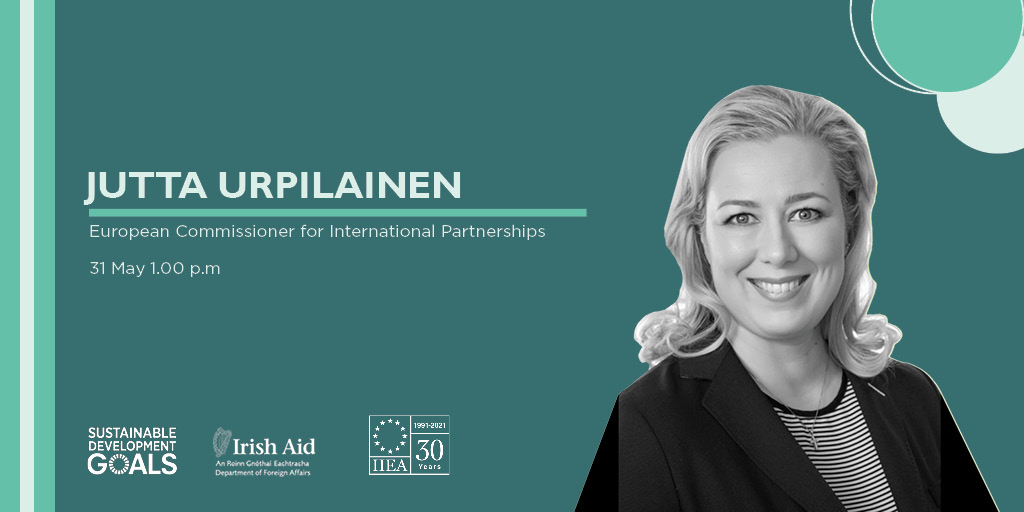Harnessing Inclusive Multilateralism for International Development

Introduction
In the third lecture of the IIEA Development Matters series, supported by Irish Aid, Jutta Urpilainen, European Commissioner for International Partnerships, made the case for a global and sustainable recovery through “inclusive multilateralism”. Inclusive multilateralism, she posited, is the best way for the EU and its Member States to pursue their international development objectives. This means more accountable and results-oriented multilateral institutions and the full participation of EU partners. In the spirit of inclusive multilateralism, she also spoke of the importance of the ‘Team Europe’ approach, the EU’s external response to the COVID-19 pandemic and its consequences.
Unilateralism on the Rise and Global Challenges Facing Sustainable Development
Commissioner Urpilainen acknowledged the changing landscape of the post-war multilateral order and the need to make it fit for purpose in order to achieve the Sustainable Development Goals. International development cooperation must now be conducted in a competitive environment, where power politics can undermine coordinated and concerted action. As a result, more and more states are turning towards unilateralism, thus undermining the partnership pillar of sustainable development that the 2030 Agenda sought to establish.
At the same time, the Commissioner recognised the growing impetus to address global challenges which require coordinated, global solutions. The climate emergency, she argued, as well as unregulated migration and a crisis of faith in democracy, have long required concerted action. The COVID-19 pandemic and its extraneous socio-economic impacts have made such action a greater necessity than ever before. EU international development, and the Sustainable Development Goals more generally, aim to address the needs of those most vulnerable. This has become a much more difficult task as a result of the pandemic.
The Director General of Irish Aid, Ruairí de Búrca, also delivered remarks on behalf of Irish Aid. From the perspective of a smaller Member State such as Ireland, he underscored the vital importance of collective approaches and collective action amongst the EU and its Member States when it comes to facing these challenges. To support the development of the partnership pillar of the 2030 Agenda and to “breathe life into” the multilateral and partnership approaches championed by the EU, Ireland needs to begin to play a bigger role in helping address the challenges facing international development and the multilateral order in which it operates.
Toward Inclusive Multilateralism and the Role of Team Europe
Against this backdrop, Commissioner Urpilainen advocated for a reinvigorating multilateralism which, for the EU, is the most effective means of regulating international relations. More specifically, when it comes to international development, she described it as the most effective way to protect the vulnerable and to promote inclusive and open societies. To do so, she cited the recent Joint Communication on Strengthening the EU’s Contribution to Rules-Based Multilateralism which states that multilateral institutions must be more accountable and results-oriented, but also must allow for full participation of all actors: public; private; regions; government; and civil society. The Commissioner described the inclusive approach Joint Communication as the most effective means of employing multilateralism for international development.
Commissioner Urpilainen also drew particular attention to the opportunities arising from the new ‘Team Europe’ approach and its initiatives. The Team Europe approach is a coordinated effort which combines the resources, expertise and networks of the EU, the European International Financial Institutions, Member States and their implementing agencies. The ‘Team Europe’ approach is targeted at responding to the COVID-19 pandemic and its consequences, but Commissioner Urpilainen also sees it as an opportunity to achieve other strategic priorities including: the European Green Deal, digital transformation; sustainable growth and jobs; good governance; and migration. Some 150 Team Europe Initiatives (TEIs) are spread across the globe and have been provided as part of EU programme funding in the Multiannual Financial Framework until 2027.
Director General de Búrca asked Commissioner Urpilainen how a Member State like Ireland can marry its work in multilateral institutions in Geneva, New York and elsewhere with its development work on the ground to best contribute to the EU’s vision for inclusive multilateralism. She paid tribute to Ireland’s thematic and regional expertise, especially in Africa, and called on Ireland to continue its support for TEIs in the region and globally. The Commissioner further acknowledged the substantial contribution of Ireland on the ground and the added value of a coordinated approach initiated by the EU and its Member States.
EU and Ireland: Delivering as One
The concept of inclusive multilateralism and the Joint Communication are expected to become especially relevant in the forthcoming UN Food Systems Summit in September 2021 and the COP26 November 2021. Reforming global food systems and addressing the climate emergency require dialogue amongst all vested stakeholders.
Rejuvenating the multilateral order and delivering on the ambitions of the TEIs have positive implications for both the EU and Ireland, the Commissioner argued. Harnessing inclusive multilateralism and coordinating more effectively could lead to a shift towards more equal partnerships for international development. Moreover, from an Irish perspective, it is worth noting that Ireland’s own Strategy for Africa to 2025 aims to improve the “inclusive and democratic nature” of multilateral institutions. While Ireland will continue to promote its bilateral development programmes, it recognises the value of cooperating with the EU in the context of ‘Team Europe’.
